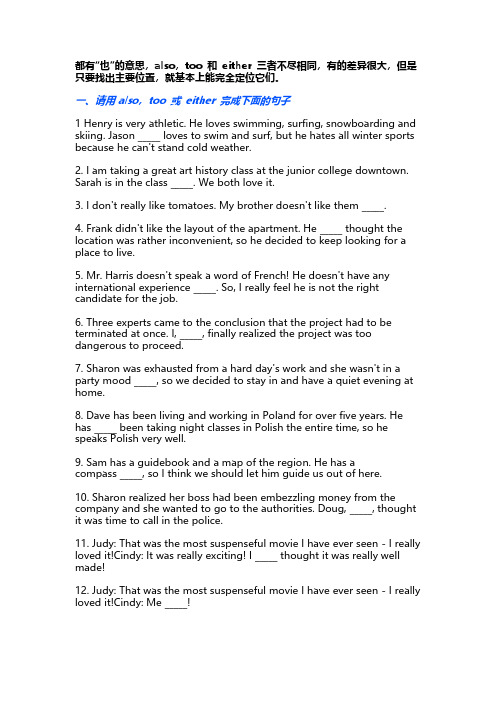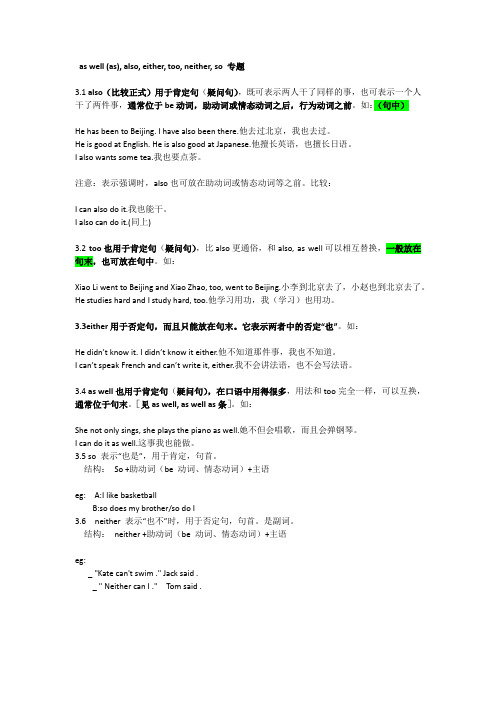tooeitheralsoaswell辨析及测试题
- 格式:docx
- 大小:218.17 KB
- 文档页数:2

tooalsoaswelleither的区别too also as well either的区别:too作为副词,意为太、过于,用于形容词和副词前;also作为副词,意为而且、也,放在行为动词之前,特殊动词之后;as well意为也、还,常位于句末;either可作代词和副词,意为任何一个、要么要么,常用于否定句,且放句末。
一、too的基本含义及用法介绍too作为副词,意为(用于形容词和副词前)太,过于,过度;也;又;还;(评说某事物使情况更糟)而且。
例句:He's far too young to go on his own.他年纪太小,不能独自一人去。
Can I come too?我也可以来吗?She broke her leg last week─and on her birthday too!她上星期把腿摔断了,而且还是在她生日那一天!I'm not too sure if this is right.这是否正确,我没有太大把握。
二、also的基本含义及用法介绍also作为副词,意为而且;此外;也;同样。
例句:She was not only intelligent but also very musical.她不仅聪明,而且极具音乐天分。
I didn't like it that much. Also, it was much too expensive. 我并不怎么喜欢它。
再说它太贵了。
She's fluent in French and German. She also speaks a little Italian.她的法语和德语讲得流利,也会说一点意大利语。
三、as well的基本含义及用法介绍as well意为也、还。
例句:They sell books as well as newspapers.他们既卖报也卖书。

also too either as well的区别和用法(实用版)目录1.引言2.also, too, either 和 as well 的含义和用法的区别3.also 和 too 的用法4.either 的用法5.as well 的用法6.总结正文一、引言在英语中,副词"also", "too", "either"和"as well"经常被用来表示不同的意思。
尽管它们在某些情况下可以互换使用,但它们之间仍然存在一些关键的差异。
在本文中,我们将详细讨论这些差异以及如何正确使用这些副词。
二、also, too, either 和 as well 的含义和用法的区别1.also:也,用于表示某个观点或行为也适用于另一个观点或行为。
例句:I like apples and I also like oranges.(我喜欢苹果,我也喜欢橙子。
)2.too:也,用于表示强调,通常放在句尾。
例句:I am very tired, too.(我也非常累。
)3.either:(两者之中)任何一个,用于表示两者之间的选择。
例句:You can choose either a book or a magazine.(你可以选择一本书或一份杂志。
)4.as well:也,用于表示某个观点或行为同样适用于另一个观点或行为。
通常放在句尾。
例句:She is a great dancer and a great singer as well.(她是一名优秀的舞者,同时也是一名优秀的歌手。
)三、also 和 too 的用法1.also:用于句中,表示两个观点或行为之间的联系。
例句:He is a talented artist and he also plays the piano.(他是一名有才华的艺术家,而且他也会弹钢琴。
)2.too:用于句尾,表示强调。

also too either as well的区别和用法(一)Also, Too, Either, As well的区别和用法1. Also•用法一:位于句首的also–用于强调一个陈述句,并提供额外的信息,相当于汉语中的“还有”–例如:Also, I will need your help with this project. •用法二:位于句中的also–用于强调句中的某个词或短语,强调方式更为突出–例如:I love hiking, and also swimming.•用法三:位于句尾的also–用于加强某个陈述句,并给出相似的事实–例如:She loves reading, also.2. Too•用法一:位于句尾的too–用于表示与前面陈述相同的情况或意见,相当于汉语中“也是”–例如:I am tired, too.•用法二:位于句中的too–用于强调句中某人或某物和其他人或物一样–例如:He, too, has a dog.3. Either•用法一:位于句尾的either–用于在否定句中表示两种选择中的任何一种–例如:I don’t like tea, either.•用法二:either…or…–用于表示两种选择之间的关系,相当于汉语中的“要么…要么…”–例如:You can either study or play games.4. As well•用法一:位于句尾的as well–用于表示除了前面提到的情况之外,还有另外一项–例如:I like cooking and gardening as well.•用法二:as well as–用于列举一系列事物时,表示“还有…以及…”–例如:He is good at playing soccer as well asbasketball.以上是also, too, either, as well的常见用法及区别。
通过合理运用这些词语,可以使你的表达更加准确明确。

都有“也”的意思,also,too 和either 三者不尽相同,有的差异很大,但是只要找出主要位置,就基本上能完全定位它们。
一、请用 also,too 或either 完成下面的句子1 Henry is very athletic. He loves swimming, surfing, snowboarding and skiing. Jason _____ loves to swim and surf, but he hates all winter sports because he can't stand cold weather.2. I am taking a great art history class at the junior college downtown. Sarah is in the class _____. We both love it.3. I don't really like tomatoes. My brother doesn't like them _____.4. Frank didn't like the layout of the apartment. He _____ thought the location was rather inconvenient, so he decided to keep looking for a place to live.5. Mr. Harris doesn't speak a word of French! He doesn't have any international experience _____. So, I really feel he is not the right candidate for the job.6. Three experts came to the conclusion that the project had to be terminated at once. I, _____, finally realized the project was too dangerous to proceed.7. Sharon was exhausted from a hard day's work and she wasn't in a party mood _____, so we decided to stay in and have a quiet evening at home.8. Dave has been living and working in Poland for over five years. He has _____ been taking night classes in Polish the entire time, so he speaks Polish very well.9. Sam has a guidebook and a map of the region. He has acompass _____, so I think we should let him guide us out of here.10. Sharon realized her boss had been embezzling money from the company and she wanted to go to the authorities. Doug, _____, thought it was time to call in the police.11. Judy: That was the most suspenseful movie I have ever seen - I really loved it!Cindy: It was really exciting! I _____ thought it was really well made!12. Judy: That was the most suspenseful movie I have ever seen - I really loved it!Cindy: Me _____!13. I am really tired, and I don't feel like going out tonight _____. Let's just stay home tonight.14. I don't really feel like going out tonight, and I am _____ really tired. Let's just stay home tonight.15. Jim is an amazing skiier, and he loves to snowboard _____.二、答案、参考翻译及解析1. also亨利很有运动天赋。


as well (as), also, either, too, neither, so 专题3.1 also(比较正式)用于肯定句(疑问句),既可表示两人干了同样的事,也可表示一个人干了两件事,通常位于be动词,助动词或情态动词之后,行为动词之前。
如:(句中)He has been to Beijing. I have also been there.他去过北京,我也去过。
He is good at English. He is also good at Japanese.他擅长英语,也擅长日语。
I also wants some tea.我也要点茶。
注意:表示强调时,also也可放在助动词或情态动词等之前。
比较:I can also do it.我也能干。
I also can do it.(同上)3.2 too也用于肯定句(疑问句),比also更通俗,和also, as well可以相互替换,一般放在句末,也可放在句中。
如:Xiao Li went to Beijing and Xiao Zhao, too, went to Beijing.小李到北京去了,小赵也到北京去了。
He studies hard and I study hard, too.他学习用功,我(学习)也用功。
3.3either用于否定句,而且只能放在句末。
它表示两者中的否定“也”。
如:He didn’t know it. I didn’t know it either.他不知道那件事,我也不知道。
I can’t speak French and can’t write it, either.我不会讲法语,也不会写法语。
3.4 as well也用于肯定句(疑问句),在口语中用得很多,用法和too完全一样,可以互换,通常位于句末。
[见as well, as well as条]。
如:She not only sings, she plays the piano as well.她不但会唱歌,而且会弹钢琴。
also,too,either,neither,so,as well的用法1.also副词“也,而且,并且”用于肯定句或疑问句,但一般位于句中,通常位于be动词,助动词或情态动词之后,行为动词之前。
如:He has been to Beijing. I have also been there.他去过北京,我也去过。
He is good at English. He is also good at Japanese.他擅长英语,也擅长日语。
We are also students.我们也是学生。
He also went there on foot.他也是走着去的。
Did you also want to have a look? 你也想看看吗?I also want some tea.我也要点茶。
2.too副词表示“也”,常用于肯定句或疑问,常和also相互替换,一般放在句末。
如:He studies hard and I study hard, too.他学习用功,我(学习)也用功。
He likes China, too.他也喜欢中国。
Are you in Grade 3, too? 你也在三年级吗?3. either①副词,“也不”用于否定句,而且只能放在句末。
如:He didn’t know it.I didn’t know it either.他不知道那件事,我也不知道。
She is not a Japanese, I’m not, either.她不是日本人,我也不是。
My sister doesn’t like this song, either.我妹妹也不喜欢这首歌。
②代词,两个中任意一个,(两者之)每一个,故作主语时谓语动词用单数。
如:Either of the books is new.这两本书任何一本都是新的.She doesn’t like either of the films.这两部电影她都不喜欢.③形容词, 用来修饰单数名词,意思与作代词时相同.如:Either school is near my home. (这两所学校中的)任何一所学校都离我家很近.Either question is difficult.两个问题(中的任何一个)都难.There are many flowers on either side of the street.街道两旁有许多的花。
三者都有”也“的意思,其中 also 和 too 可以以相同的方式使用。
然而,我们把它们放在不同的地方,在肯定句中使用 also 和 too,而在否定句中则使用 either。
其中,also 放在 be 动词和在情态动词之后,实义动词之前,而 too 放在句尾,此时它的意思跟 also 一样,所以解答此类的题目,只需判断句型或位置就可以了。
一、用 also,too 或 either 完成下列句子1、I don’t like cold climates. I don't think you like it _____.2、My friends are going to college next year. I am _____ going to college next year.3、My wife is a diligent engineer. I am a diligent engineer _____.4、I love swimming. My son loves it _____.5、Today the weather isn't so good. It wasn't really good yesterday _____.6、I eat a lot more than an average person. My brother _____ eats a lot.7、A bear can run very fast. A tiger runs very fast _____.8、I am not from Italy. My friend isn't from Italy _____.9、Paris is a big city. Madrid is _____ a big city.10、French is a difficult language to learn. Latin is a difficult language to learn _____.11、Henry is very athletic. He loves swimming, surfing, snowboarding and skiing. Jason _____ loves to swim and surf, but he hates all winter sports because he can't stand cold weather.12、I am taking a great art history class at the junior college downtown. Sarah is in the class _____. We both love it.13、I don't really like tomatoes. My brother doesn't like them _____.14、I am really tired, and I don't feel like going out tonight _____. Let's just stay home tonight.15、I don't really feel like going out tonight, and I am _____ really tired. Let's just stay home tonight.二、答案及解析1、either解析:在否定句(don't)中用 either。
also too either as well的区别和用法摘要:1.介绍also, too, either 和as well 的含义和用法2.区分also, too, either 和as well 之间的差异3.提供实例说明这些词的用法4.总结这些词的用法和注意事项正文:一、also, too, either 和as well 的含义和用法1.also:用于肯定句中,表示“也”,“同样”2.too:用于肯定句中,表示“也”,“同样”3.either:用于否定句和疑问句中,表示“也不”,“任何一个”4.as well:用于肯定句和否定句中,表示“也”,“同样”二、区分also, too, either 和as well 之间的差异1.also 和too 的用法相似,都表示“也”,“同样”,但是also 用于较为正式的场合,而too 更常用于口语中。
2.either 用于否定句和疑问句中,表示“也不”,“任何一个”,而also 和too 只能用于肯定句中。
3.as well 用于肯定句和否定句中,表示“也”,“同样”,与also 和too 的用法类似,但是as well 可以放在句首、句中和句末。
三、实例说明这些词的用法1.also 的用法:I like apples and oranges.I also like bananas.(我也喜欢香蕉。
)2.too 的用法:She likes apples and oranges.She also likes bananas.(她也喜欢香蕉。
)3.either 的用法:I don"t like apples.I don"t like oranges either.(我也不喜欢橙子。
)4.as well 的用法:I like apples, oranges, and bananas as well.(我也喜欢香蕉。
)四、总结这些词的用法和注意事项1.also, too 和as well 的用法相似,都表示“也”,“同样”,但是它们在不同语境下的使用频率和场合有所不同。
too;also;either;as well的区别too;either;neither;as well as;有什么区别also, too 和 eitheralso表示"也"是比较正式的用词, too 是普通用词,口语中用的多,使用时应注意:also 一般用于句子中,其位置在行为动词之前,动词to be之后。
如有助动词或情态动词,一般应在助动词或情态动词后,为了强调,也可放在前面。
例如:*I also went.我也去了。
*You are also wrong.你也错了。
too常置于句末,前面可用逗号,如置于句中,其前后均有逗号。
例如*He is a singer ,too.他也是歌唱家。
*He,too,is a singer.注意: also,too只能用于肯定句。
either 表示“也”,只能用在否定句中,必须放在句末。
例如:*He didn''t go there. I didn''t either.你不去那里,我也不去那里。
neither表示"两者都不"。
Eg. In neither case can I agree.两种情形我都不能同意。
Eg. Neither of them wants to stop for a rest.他们俩人谁也不愿意停下来休息。
as well as 作并列连词相当于not only…but also和no less…than,但not only…but also侧重在后项,as well as 和no less…than侧重在前项。
例如:We must learn to look at problems all-sidedly, seeing the reverse as well as the obverse side or things.A true man should be practical as well as far-sighted.在否定句中,as well as 的位置不同,句意往往有很大差别。
tooeitheralsoaswell
辨析及测试题
Revised final draft November 26, 2020
too,either,also,aswell辨析及练习(25题)
too放在句子末尾,通常用逗号隔开.
either在否定句中使用,但是放在句子末尾,通常用逗号隔开.
also则放在系动词be之后,实义动词之前.
aswell用在肯定句中,放在句子末尾.
选择too,either,also,aswell填空。
1.Makingsoupisnoteasy,andbeingagoodchefisnoteasy,________
2.Hegavemeadviceandmoney________.
3.Hewillgototowntomorrow,Ishall________go.
4.Ican'tplaythepiano.Hecan't,________.
5.Myfatherlikesreading,andIdo,________.
6.Ilikeyou________
7.Aretheycoming________
8.Ifhewantstogo________,heshouldmeetusat8:00.
9.Frankcancomewithus.Nancycancomewithus________.
10.IamCanadian________.
11.IcanspeakFrench________.
12.Ilovechocolate.Ilovepizza________.
13.Iamstudyingeconomics________.
14.Janedoesn'tspeakFrench.Samdoesn'tspeakFrench________.
15.JanespeaksFrench.SamspeaksFrench________.
16.Idon'tlovechocolate.Idon'tlovepizza________.
17.Frankcannotcomewithus.Nancycannotcomewithus________
18.Ihave________beentoHongKong.
19.Iam________studyingeconomics
20.Iamastudent,________.
21.Lucydoesn'tgototheparty,________.
22.LiMing________tookpartinaceremony.
23.Shehasknowledgeandexperience________.
24.Billcan'tstandgameshows.Ican'tstandthem,________.
25.I________havetofinishmyworktoday.